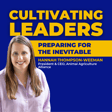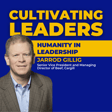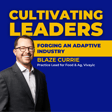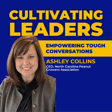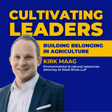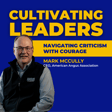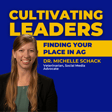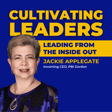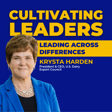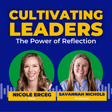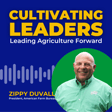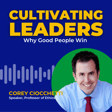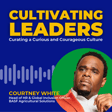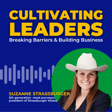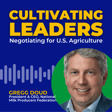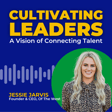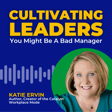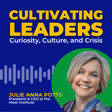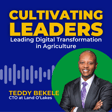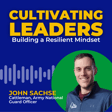Become a Creator today!Start creating today - Share your story with the world!
Start for free
00:00:00
00:00:01

The Art of Networking with David Nothmann
Level-up your career by investing in the relationships that really matter. David Nothmann — a seasoned strategic growth leader with 25+ years of experience in agriculture, technology, and food innovation—joins the Cultivating Leaders Podcast for a discussion around building relationships. He shares practical insights on how leaders can build trust intentionally, approach networking as a learned skill, and play the long game when it comes to cultivating influence.
David dives into:
- Relationships as an Asset: Real success is built through authentic, long-term relationships
- Networking How-To’s: It takes an intentional mindset, preparation, and follow up.
- Building Trust in Professional Relationships: Investing in people early builds the trust needed when stakes are high.
Whether you're navigating career growth or leading change, David's mindset of "relationships first" offers a blueprint for a lasting leadership impact.
Transcript
Introduction and Purpose of the Podcast
00:00:01
Speaker
and One of the questions I sometimes ask myself, or I encourage other people to ask themselves is, well, what could I learn from this conversation? to be a one-on-one, could be in an event, but what could I learn from it?
00:00:17
Speaker
Welcome to the Cultivating Leaders podcast, where we get inside the minds of changemakers in food and agriculture to harvest ideas that help you grow as a difference maker. I'm your host and curiosity captain, Nicole Ersig.
David Nothman's Background and Leadership Philosophy
00:00:30
Speaker
Today's guest is someone who doesn't just talk about leadership, he builds it one authentic connection at a time. David Nothman is a strategic growth leader with more than 25 years of experience in agriculture, ag tech, and food innovation.
00:00:43
Speaker
He's held executive roles at startups and global companies alike, helping scale new technologies, grow teams, and navigate change. But if you ask him what made the biggest difference in his career, it probably wouldn't be a product launch or a title. It would be the people.
00:00:57
Speaker
David believes relationships are the most valuable currency a leader has, and he's here to talk about how to build them with intention, depth, and impact. David, welcome to the podcast. Glad to be here. Thanks for having me. Did I get anything wrong in your bio? You didn't you didn't get anything wrong. ah you You changed it up and I love that. There was one thing you were missing. What am I missing? Well, I'm the father of two very different, wonderful teenagers. And that is part of who I am and the the family. And we're going to talk a lot about relationships.
00:01:25
Speaker
I'll tell you that my my boys have made me a better person. I continue to learn from them and because of them. Whatever they choose, I hope that they find a welcoming community like AFA full of good people, great mentors. And so that's maybe the little piece you were missing that was part of how it's going to tie in today. But I'm a husband and a brother, and we're going talk a little bit about family and how those friendships and bonds are important. But everything else, I think you're you're pretty spot on.
00:01:52
Speaker
Awesome. Well, I love that. That's a great, great connector. You are someone, I think, who is ah building the type of community that you hope your your children get to enter from a professional standpoint someday.
00:02:03
Speaker
I also guess we did not mention that you are closely tied with AFA. ah You've been a past board member, huge volunteer, are one of our executive ambassadors. So very much appreciate the work you do with AFA as well.
Importance of Relationships in Business
00:02:14
Speaker
I am curious, David, agriculture is an industry that's built on trust, but but talk to us about how relationships have impacted major business decisions in your career. you know, I think relationships provide a sense of belonging and they provide that that trust that you mentioned is is so important. And they don't they don't just happen. They're something you got to invest in.
00:02:37
Speaker
I can think of a couple examples where you know, the easy decision or the straightforward transactional decision may have been different than one with ah with a partner who I knew for a long time.
00:02:48
Speaker
was like, well, I wonder why they're doing that. And usually it's an assumption I've made or a miscommunication or something down the road. And it's it's come back to having that conversation and and realizing like, that's not the the person that I, you know, that's not what I think they'd be doing. So I'm missing something. And it it gives that friend, right, that relationship more of the benefit of the doubt so that you don't do a trigger reaction or response. And so I've i've had that happen a few times in in high stakes situations.
00:03:17
Speaker
And a couple of them are a little confidential, but but some of them are, and I'm sure we'll talk a little bit about this, but some of them are are are situations where I've known a person or a company or people at a company for a long time. And we've invested, both sides have invested in in establishing a stronger relationship and ah and a more solid relationship so that, you know, could have a tough conversation.
00:03:40
Speaker
So I've seen that time and again, and it changes the dynamic of that hard conversation.
David's Journey into Agriculture and Career Highlights
00:03:47
Speaker
Yeah. Just to give folks more of a ah background of you, how did you get into agriculture and talk about some of the roles or or leadership experience that have been a part of your career?
00:03:56
Speaker
Yeah, I mean, I didn't grow up on a farm and I didn't study agriculture. I followed a passion around environmental issues. I was at an MBA school and I was i was the guy in overalls at it at NYU running around New York City because I liked them. They were comfortable, but followed a passion for environment. I applied for an internship with all the major chemical companies saying, hey, I want to understand these companies can't all be that bad.
00:04:20
Speaker
And I got a ah role, an intern with Monsanto. I ended up working there for 13 years with a lot of different roles and responsibilities while I was at Monsanto. And you asked about other other changes and responsibilities later on. I left a leadership role at Monsanto, take a leadership role at Arborgen, which is a tree seedling and biotech company.
00:04:39
Speaker
Smaller pond, bigger fish, I guess, had more responsibilities in that case, which was product development and product management and business development and and sort of the regulatory frameworks as we brought products to market.
00:04:51
Speaker
Yeah, I went on from there. I i headed up. I wanted P&L accountability. I spent some time at Patel leading two profit loss centers. Ended up partying there to come out here to to California, um where we've been for coming up on eight years. Came out with Valent USA, Sumitomo Chemical North America arm.
00:05:08
Speaker
Headed up their marketing. Also headed up several P&Ls for them. Really had ah had a great experience at Valent. Learned a lot more about sustainable solutions, founding that, and and ultimately took a role at a startup, a growth stage startup called Terramera. It's called something else today. they've They've kind of done some different things.
00:05:26
Speaker
Took a role after that at Unfold as the chief operating officer. And I'm currently having exited that business, a sale to Bayer, a startup that's always a good thing to be able to exit. I'm kind of looking for my next big thing.
00:05:39
Speaker
Right. So I've done, so I've leaned into the board work that I do. I'm doing some consulting work, but ultimately I'm, I'm ready to to take on the next big challenge and confer leadership positions could be at a big company, could be at a small company. There are pros and cons to each, but that's how I got to where I am. And I've really had a blessed life and experience along the way.
00:05:58
Speaker
That's incredible. Thank you so much for sharing. I think you don't have that kind of growth and different types of opportunities without being a builder of relationships and connections. And and that's how I know you as someone who is a great connector and bridge builder of people.
00:06:12
Speaker
Is that something that has always come naturally to you?
Networking Tips and Overcoming Anxieties
00:06:15
Speaker
No. my my My wife, Jessica, my brothers would probably laugh when I told them, you know, i kind of started out more, but much more introverted.
00:06:24
Speaker
Today, i feel like i can go to a room and talk to anybody because they see that. That's how they see me today. I'll i'll go and I'll talk to anybody. But that was not how I was wired. And I was definitely a little bit more shy and and hung back. A lot of high school dances, that's where I was in the back, back, not asking people for for dance floor.
00:06:42
Speaker
So I learned it by just putting myself out there. And I don't necessarily think it was a mentor in that case. I think it just was something I realized I had to do. And then I started to like it. And then I started to realize it paid dividends. And I'm sure we'll talk a little bit about that journey, having those connections and and and networking. But for me, no, it did not come naturally.
00:07:00
Speaker
So how did you overcome that? Because I think a lot of people feel that way. Like when you say the word networking, like some people have a visceral reaction, right? Like dread. How do you overcome what makes so many people uncomfortable in those situations where you've got to walk into a room you don't know anyone and build connections? Yeah.
00:07:17
Speaker
Yeah, like I think with everything, we grow when we we fail. We grow when we are stretched in ways that we don't want to. And I think it's the reminder of, OK, I'm not necessarily going to love this, but I'm going to learn something out of it. or I'm going to meet somebody. Right. And one of the questions I sometimes ask myself or I encourage other people to ask themselves is, well, what could I learn from this conversation? Could be a one on one, could be in an event, but what could I learn from it?
00:07:42
Speaker
right And if you're really more of the academic person and and don't want to do that, go about it in an academic manner. right so So say, what could I learn? Okay, these are three things I want. Write it down. Go in and have that conversation because you're going to already be more prepared than you otherwise would.
00:07:56
Speaker
Have the conversation. And then when it's done, whether it's online or whether it's at a conference, go back and look at your list. I'm guessing that that of the three to five things that you wrote down, maybe one of them happened.
00:08:09
Speaker
And four others that you didn't think of also happened. Right? And then you're like, wow, i I learned some things that I didn't know or didn't think I'd know. What are some questions that you might be able to ask? Like with everything, you want to be prepared.
00:08:21
Speaker
So why are you anxious? Are you anxious because you're not prepared? You can prepare. Lots of things you can do to prepare. Oh, I love that. I love the mindset of what can I learn from this conversation because it also takes some of the pressure off of you, right?
00:08:35
Speaker
Of, okay, I'm going to walk in here and i'm going to see what I can learn from other people. I'm not focused on, okay, what is my elevator speech? What am I going to tell them about me? All of those things. I do think there's value in practicing an elevator speech. I do think being succinct is important, but it doesn't have to be about you. And in fact, you're going to have a better connection with somebody if you get them talking.
00:08:54
Speaker
Yeah, absolutely. Do you have any other advice for getting people talking? We can start with what do you do, but if you can migrate them and get them talking about their family, you get them talking about their hobbies, right, that's a connection. And you should be searching for overlap, things that that you share, because those commonalities are going to be a genuine connection, right? And you want it to be genuine.
00:09:16
Speaker
you have any pets, right? I mean, you don't need to lead with that, but somewhere work that in. They'll start talking about their dog or cat or horse or whatever. And if you have a pet, they'll probably ask you in return and there you've got a connection.
Maintaining and Leveraging Professional Networks
00:09:30
Speaker
So how do you know, David, when to keep pushing forward in the conversation or, okay, maybe they're not feeling it, maybe you're not feeling it. How do I know when to move on? I think it depends, right? i mean, I think that if you're in ah at a conference and there are lots of other people, there are easy ways to exit. If it's a video conference where it's a one-on-one, know, there's a socially acceptable way to to exit.
00:09:51
Speaker
But really ask yourself, am I doing this because I'm uncomfortable? And remind yourself that your discomfort is going to help you grow. Or am I doing it because I think they want to go? They're not comfortable. and And why is that? What else could I do to make them feel more comfortable? But let's assume that both parties are are ready. Part the conversation in a conference setting, you might be like, hey, I really appreciate X, y and Z, right? Something you learned about them and and make it genuine. whatever Whatever you learned that was genuine, I appreciate the conversation today. And don't forget, in this case, you may think you don't want that contact, but there's no harm
00:10:26
Speaker
and asking for the card or today the digital card or the LinkedIn connection, whatever it is, there's no harm in that, right? So so go ahead and do that and then say, but I'd really love to network with some other folks. I'd love to talk with with somebody else.
00:10:39
Speaker
I really appreciated it. And then you know just move on. It's not not necessarily hard when there's a group of people. When it's a one-on-one person, you might try something else. You might just say, look, I've enjoyed the time, same upfront piece of work there, but i I think I've got some things that I want to reflect on and may want to come back with you. Always keep that door open if you can. Always keep that door open.
00:11:00
Speaker
And in some cases, you definitely want it. and In the scenario you just built, you don't necessarily know that you want it, but you can still keep it open. Other cases, you know you want to come back to them, so you may want to be more specific in saying something like, well, could I call you in a week or two?
00:11:14
Speaker
Try to get them to say yes. Would it be okay if I reach back out to you about this or about, right? and And most people will say yes. I don't think I've ever had somebody say, well, no, it's not okay.
00:11:25
Speaker
But that gives you the clarity that you you need maybe to reach back out to. So I think, you know, you just say, hey, um'm i've got I've got a run here. Thanks for the conversation. I hope you have a great day.
00:11:36
Speaker
and then And this is the piece that a lot of people forget, right? I think any networking, you can do pre-work if you can, sometimes you can't, you do the actual interaction and then what's the post-work.
00:11:47
Speaker
And that post-work is almost always forgotten. ah Sometimes people do it or do part of it. I forget it sometimes. Like I got more follow-ups, I get back into my life and my swing of things. But even if that was an interaction where you're like, I just wanted to get out of it, step back, go for a walk,
00:12:04
Speaker
Come back and be like, what did I learn? What was the one or two things that I learned? Send them a note. If you're not already connected on LinkedIn, send them a LinkedIn request. Make a comment of just say, really appreciate the conversation today and specifically this. Right.
00:12:18
Speaker
And then you've got a LinkedIn request and a new contact, hopefully. No harm in any of that. Right. Yeah. What do you say to people who would feel like, oh, well I don't want to bug them. I don't want to bother them I hear that a lot. I have a friend, a seasoned 30 year in the industry, and she says that a lot, right? I don't want to bother them.
00:12:36
Speaker
And so following up with somebody and thanking them is not a bother. If it's a reach out in the first place, you can do a couple of things. You can ask for an introduction. And I do this with people I've just met.
00:12:46
Speaker
And I do this with people I've known for 30 years. I'll use the phrasing of a friend who I reconnected with. This is a high school friend who I didn't talk to for 20 years. And then we've reconnected recently. And he has a podcast.
00:12:57
Speaker
And at the end of it, he always asks, and I'm going to mix up the phrase. And he says, who is someone that you know that I don't know that I should know? And he does that with people he's just met and people that he's known for a long time. But that's the same thing. I don't use that phrasing necessarily, but I often will ask, you know, based on the conversation, is there somebody who springs to mind that you think would be a good person for me to meet?
00:13:18
Speaker
And if they've just met me, then I might say, well, well why do you think that's a good connection? right and then they'll something sometimes they don't have somebody but you can follow up in an email or a text or a linkedin dialogue chat that's how i network a lot getting that next referral getting that next referral getting that next referral for people who really know you they'll have people that they think about and it doesn't have to be oh because they're in your line of work could be because oh i know you both have dogs and you like to run you know okay well that's a connection And then you don't know where it's going to lead.
00:13:50
Speaker
I heard something the other day. i won't say their names. I don't want to But I heard from a CFO at a company. He'd come back to the Bay Area and his wife and the CEO's wife had some connection at yoga or something. And they started talking and they were like, oh, you your husband's an ag. Oh, my husband's an ag. Right. And sooner than you know it, they're working together at the same company.
00:14:09
Speaker
I've had that happen. My wife and somebody else's wife, they were den mothers together. Same conversation. So you never know where that connection is going to be. Our boys were in Cub Scouts together. Turns out that we're friends now for 20 years, up essentially.
00:14:23
Speaker
Right? Yeah. That's amazing. Do you have any stories in your career where a, like what maybe felt like a chance connection or a small interaction turned into something big down the road?
00:14:34
Speaker
Yeah. i don't know if it's a chance interaction because i ended up getting a job there but i'll tell you a story about somebody who has continued to be a coach and mentor in my life and we are we we are so different we are just very very different people and so i went to interview arborgen i'll name at least by first name i went to interview at arborgen and i flew out there and he picked me up at the hotel years later he would say well david i was watching you from that first interaction I was watching how you interacted when you checked out. How did you treat that person?
00:15:06
Speaker
That was some really good insight. Now, this person is somebody who I go to now for all sorts of advice, right? I go to advice on my kids. I go to advice my career. But we are very, very different people just in how we...
00:15:18
Speaker
Think of the world. But at the heart of it, we value relationships and we value friendships and and we respect those differences that we have. I would say we've got a lot of similarities, too. But at any rate, that that was something that ah if you had asked me, would you be this person's friend? I'd be like, i don't know.
00:15:35
Speaker
That's awesome.
Using LinkedIn for Networking and Personal Branding
00:15:36
Speaker
Okay. I do want to talk about follow-up because you you hinted to this. And for anyone who is not connected with David on LinkedIn, he is very active. And I always see you and in the comments of people's stuff. So I think you do a good job of follow-up from a LinkedIn standpoint.
00:15:51
Speaker
One, how did you get started on that? And two, what advice do you have for the LinkedIn follow-up? I got started on LinkedIn early. So don't look at, i don't know how many I have, X number of connections be like, oh, well, how do you that? There was a lot of, a lot of it was time and consistency. Like, you know, it's the same thing about weight loss or exercise, fitness, you know, you got to just put in some time and. Yeah. You got to do the rep. You got to do the reps. You got to do the work and the work in LinkedIn is, you know, have a, have somewhat of a profile.
00:16:20
Speaker
First thing you can do is go. And it's not just about finding a job. A lot of people think it's about finding a job. a lot of times it's for me, it's about seeing what is going on in the industry. So you can apply and be accepted to parts of groups. There's there's agriculture groups and ag tech groups and all sorts of things that you can follow and like and and get information so you can start consuming it. That's sort of the ah low risk, low reward, but low risk entry point and have something on your profile about what you've done now.
00:16:47
Speaker
It depends on who you talk to. Some people say I got too much on my profile about the things that I've done and others will say it's great because they really know some of the things that I've done in my career. i don't know. Just at at one point, that was the way to do it. I don't know if it still is.
00:17:00
Speaker
But having a little bit of detail does give people something to to latch on to. And if you want to sort of go the full other route, you you have to know you have to start by knowing who you are and then what is the persona you want to be out there, right? And I wouldn't make those like drastically different.
00:17:16
Speaker
But one of the things is if you're going to post on LinkedIn, different from liking, but if you're going to post something, make sure it is that is part of your persona, who you are. Now, that seems like it's easy to do, and it is actually not that hard. You just need to make sure that you're not doing things for the wrong reasons. Don't go down that.
00:17:34
Speaker
path of sort of saying, I think I should do this versus this is who I really am. I often say if you're going to send an email to somebody, if I were to be like, oh I want to send Nancy this email about something I've read, I think she's really going to like it. I may still do that, but why wouldn't I just post about it on LinkedIn?
00:17:50
Speaker
Read this article and these were three things that I thought about. There's no real harm in that. And and of course, the more people you have as connections, more people who are going to like it and and share it and do other things.
00:18:02
Speaker
And sometimes those insights can be brief and they can be a repost of something that somebody else has done. And sometimes they can be like, I've really been thinking about this. I did one on on water in California, and it's a lot about water rights in California that I don't know.
00:18:18
Speaker
And I put that out front. I was like, look, I am not an expert, but based on what I know. And somebody wrote on the comments, they're like, you know you you mischaracterized this. They were very kind about it. And I changed the post to reflect that.
00:18:31
Speaker
um based on you know data that they had and and information that they shared with me. I think posting on something that means something to you, whether that's an email that you might forward or an article that you might forward, why are you forwarding to that person? Why not just post it on LinkedIn? Yeah, share it with someone or share it with multiple people.
00:18:50
Speaker
Share with all people, all sorts of people. And then you can ask a question. I see sometimes this works better than others, so don't be discouraged if it doesn't work. You can ask a question like, share your best practice establishing a new habit or whatever you're posting on. And sometimes people do post things and other times they don't. I've had posts that have gone, you know, 5,000 impressions or something, and I have no idea why that one went and another one didn't.
00:19:13
Speaker
um I do think there's something about tagging people, whether it's a hashtag or putting their name and their link. That will help because if they have a lot of contacts, then, and this is where I said I could probably do a whole podcast around this.
00:19:27
Speaker
Because i like it, I think it is a good tool. That's all it is, it's a tool. But then people who do like it, I go back and I see who's liked my comments or my my post who I don't know, right?
00:19:42
Speaker
if there It shows shows all these first degree connections, people I do know. And then it'll show some second or third degree connections and I'll look at them online and I'll be like, and remember when you look at them online, generally they see that you've looked at them.
00:19:54
Speaker
So I'm like, well I've already looked at them. I might as well ask for ah connection request. So ah what we've talked about has been a lot of like the first stage of a relationship building. How do you maintain that momentum and continue to grow and develop the relationship once it's beyond that?
00:20:10
Speaker
Okay, initially we made a connection or now we're connected on LinkedIn so that that it doesn't just feel stale or transactional. Yeah, that's a great question. i think it's got to be genuine. You've got to have a good memory, or if you don't have a good memory, you have to have a good note-taking system.
00:20:25
Speaker
um Some people, I'm a big believer in CRMs. I don't actually use it that much with my personal interactions. It's not like I'm going to say, oh, so-and-so has two kids and a dog and three cats, and I'm going to put that all in some system. I don't generally do that with this type of uh networking and relationship but i have a decent memory and sometimes i'll put something in my a microsoft office contact info if if if i'm like don't know if i'm going to remember that i'll give you some more concrete examples a guy was interested in startups on my i don't know how he got contacted me other than i probably have investor which is probably overstated i do investments but they're really small ah with startups so he he got out he reached out on linkedin
00:21:06
Speaker
And he said, well, would you look at my pitch deck? So I did. His name was Alika Chuck, Alexander Chuck, Alika. But he's, I don't do much in animal ag. So at the last leaders conference, there were so many animal ag students there, right?
00:21:20
Speaker
More than I'd ever seen, really. And so I had, you know I had people asking, well, what do you do? And I said, well, I don't know, but I don't know that many people in animal ag. I'll introduce you to this guy who I just met, who's, you know, heads up Merck's recruiting or, or whoever, right? and And so I was doing that actively during the conference.
00:21:38
Speaker
But I also said, hey if you're interested interested in the startup side, here's this guy, Lee Kachuk, and I would introduce people in animal ag just because these are two people, never met each other, but they they might have something in common. And when other people reach out and keep that alive, and there are a number of folks at AFA who followed this, I won't say formula, but but it's I would say, you know be genuine, do your homework in advance, ask questions during it, do the follow-up on email, social media, and stay connected in that genuine level. And and the people that I would sort of call out, who I know beyond the staff, Mercedes, Michael Kerr, these are people who I've known for a while. But Topanga, who you may know, Topanga Daly, McBride previously, Topanga, she had in in her memory that I got up
00:22:26
Speaker
I didn't even remember it, right? I just did it, right? But she was like, oh man, he got up really early and met with me because I just wanted meet with him at some conference. and And so she reminded me of that, introduced me to her fiance at the time.
00:22:40
Speaker
she just She does it. She reaches back out to me. I'm interested in her. I follow her when she's doing something. um I just commented on a post today. That's why it's in my head. Taylor and Micah Menzing.
00:22:51
Speaker
I knew Taylor from something else. And then I knew Micah from AFA. I kind of knew them both, but I didn't know they, you know, obviously they got married, but they continue to stay in touch with me. Raymond Yan, another guy who I met, I think through AFA, but I've now seen at Farm Foundation. I've seen him out here in the Bay Area.
00:23:07
Speaker
These are people who just also make the reciprocal effort. So what do you do? You just continue to to say, oh, I think so-and-so would be interested in this. I'm going to connect going to tag them, right? I'm going to tag them in a post. I've tagged, I think most of the people I just mentioned.
00:23:21
Speaker
I have a passion around bringing more people from the coast to the leaders conference. I'm passionate about it because I just, I think um what you all do is so great and it started in the heartland. So it's sort of got a bigger following in the heartland. it's harder to travel from the coast. So there's a guy who's been a few times, I think he's now graduated. I know he's graduated Emilio and I've seen him out here many times in different situation.
00:23:46
Speaker
And I've tagged him in in posts around robotics. Cause now he's, he's working, I think with Verdant Robotics. and And calling people. I get texts from Raymond. so And they're not invasive. They're just like, hey, I was thinking about this. And then I'll you know text him back or or get on the get on a call with them I love that. It actually kind of goes perfectly into what I want to talk about next, which is how do you build relationships across generations in the workspace?
00:24:11
Speaker
I know this is something that gets talked about a lot, but there's a lot of common age gaps in agriculture or in many of the workplaces that we're in. And you're talking about like you have had a very fruitful career, but you also build relationships with people who are are just entering their career too.
00:24:26
Speaker
Yeah, I think there needs to be a certain amount of humility. i can't speak and won't try to speak for the younger generation. Ask that same question of Topanga, Raymond, or somebody else who's younger than I am. But for me, i would say there's got to be a humility for somebody who's more established in their career.
Learning Across Generations and Personal Growth
00:24:42
Speaker
to say i can learn something from this person and they've got something to share and what is that and and there's a lot i mean i i serve on a couple personal board of advisors and i always encourage them to bring somebody onto the board who's younger than them for a different perspective right so a lot of people think oh i can only get i can only get advice from people who are more established and the answer is absolutely not like have somebody on your personal board of advisors who's maybe younger less experienced but still accomplished in their own right right there's gotta to be a reason you have them there Hey, David, can we pause for a second? I know you and I are both very familiar with the personal board of advisors, but for any of our listeners who don't know what what we're talking about when we say that, can you explain what that is and why it would be important to to have one?
00:25:23
Speaker
I will succinctly try to do that and then also guide folks to my LinkedIn page or AFA's page where they ask me to do a one-hour session on personal board of advisors. So if you want more in-depth, there are resources out there.
00:25:37
Speaker
And honestly, you know this isn't a term that I've coined. It's something that's been out there for several decades, which is essentially you know companies have board of directors that help them guide the company right ah financially, but also growth and all sorts of other areas. And like that, how do you establish you know somewhere between three to five people that serve on your personal board of advisors that are going to keep you accountable and push you to your best self.
00:26:07
Speaker
So there there has to be somebody you trust and you meet with them regularly. You meet with them one-on-one. I think the best personal board of advisors also have some meetings where all the board members are present because you can learn from other board members. That's a little harder to coordinate, but I've seen it work and be beneficial both for the board members and for the person who's got that board of advisors. So that's what a personal board of advisors is. Help you guide in your career.
00:26:30
Speaker
Yes, absolutely. Do you have someone younger than you on your current personal board of advisors? I do not. And that's a fair question. I actually need to revise my personal board of advisors as my career has changed.
00:26:42
Speaker
um I actually have a list right here. I'm not going to show you who's on it, but I've got you know several people and I'm trying to think through who I want on there. And there is ah comment of some people who are younger. So I don't currently, but I do have a list going as I'm thinking through my next stage and who I feel like needs to be on that.
00:27:03
Speaker
Oh, I love that. I love that you're thinking about it, that you've got a list and a sticky note next to your desk. I think such an example, right, of practice what you're preaching.
Building Trust and Relationships in Teams
00:27:11
Speaker
Oh, cool. You have led teams, David, through growth and change. And we've talked a lot in this conversation around like networking and some of that initial kind of relationship building. But let's talk about building trust and what advice or or recommendations you may have to building trust when you're the new person in the room.
00:27:27
Speaker
It's funny when you think about long term relationships and trust, it takes time. We would do these three-year stability studies when I was at Battelle on chemistries and people were like well, can we do them faster? No, they're three-year stability studies. They take three years, right? And so trust also takes time.
00:27:44
Speaker
And I think coming back to what can you do to establish that trust is you spend time in the moment with that person. That sounds so easy, but in the moment, put down your phone, put down any other distractions, make sure that you are truly with them.
00:27:58
Speaker
and experiencing something with them. And if you can have a meal or a run, you know, go and do something special with them. When I was at Valent, and we did this when I was at Monsanto as well, but but Valent's a little more recent, we had a very strong relationship of which some of the P&Ls that I covered, some of those were very, very interconnected with New Farm.
00:28:22
Speaker
And so i I established a steering committee and everybody on that steering committee, people more senior than me, and in some cases people within the group, but the steering committee was committed to arriving a day early so that we could have a meal together before we got off. We'd have an agenda that we would go through and and people came and had their presentations or updates, but we were very committed to that social time before, right?
00:28:46
Speaker
Have a meal, do something. i'm not much of a golfer, but you can golf, fish, do something else, but spending that personal time and connecting. I'm a believer in doing that before any type of big meeting anyway, because sort of takes the pressure off of that initial interaction.
00:29:01
Speaker
But in this case, the high stakes, I mean, millions, tens of millions of dollars associated with the relationship. And people showed up. people People genuinely showed up. they They started to get to know each other.
00:29:13
Speaker
when they We talked about this early in the podcast, but when there was an issue, and and there was, and again, I won't go into tons of detail, but there was an issue, you could pick up the phone and have that conversation with somebody and be like, hey, this doesn't feel great.
00:29:26
Speaker
Like in the marketplace, this seems to be what's going on. and you could listen differently. So I think, Anytime you can share that experience. Sometimes you can follow them on Facebook and some people use Facebook for work. I just use it for personal.
00:29:38
Speaker
Brendan Deck is now retired or on the board. i forget, but he was the person I interacted with quite a bit. He was more senior than me, but I follow him and his family, celebrate their events on Facebook that may not be on LinkedIn. And so I think that when you are able to have that genuine connection and and and they're like, yeah, i'm I'm okay being a Facebook friend, right? Different from my, it's a personal friendship that's beyond.
00:30:03
Speaker
I think those are are ways that you kind of know, like I'm not going to be everybody's Facebook friend for for some people. and And some people, are some people are out there, Facebook is so old, my kids are like turning over. So I got to get my, my TikTok account going or something.
00:30:18
Speaker
That's okay. Different platforms for different folks. I love that you said though, how trust takes time. And I think sometimes there is a pressure to provide the results
Balancing Results with Relationship Building
00:30:31
Speaker
or perform. And sometimes these, like this work takes relational work as well. And relational work just takes the time and the investment.
00:30:41
Speaker
And you've got to work on that part first before you can get through to what maybe we would consider work. Do you have any thoughts on how you balance that like results-driven leadership, you've got to get stuff done, but also relational work?
00:30:53
Speaker
when we're there at the end sitting, you know, it's the relationships that matter, right? And it's the relationships, whether they're with family and friends or close close colleagues from work um who are essentially friends at that point, that's who you're going to remember. And you're not going to say, oh, well, I i made the quarter, right? Or I didn't make the quarter. And I think you've got to i think you just have to remember the long game. That's what's important.
00:31:18
Speaker
Yes, you still have to perform, but Are the results realistic, right? Are they something you signed up for? want to talk a little bit about results for a second, right? had somebody reported to me, he's why can't we do things the way we've always done them?
00:31:32
Speaker
Well, we wanted to grow and doing them the way we've always done them would keep us at a flat level with increased costs. So our margins would go down. And so I'm a believer that never do things go entirely as planned, right? You have a budget and it's wrong the minute after you you establish it.
00:31:47
Speaker
And so if you're like, okay, well, we're not going to make that sale. What are some other things that you could do right to help fill that gap? come Come with some ideas. Come with some ideas. And sometimes those take money and investment. And if it's going to make money, then you're going to invest some money, even if it's tight, if you believe that it's really going to turn out positively. And so I think the results piece is important, but more important at the end of the day are relationships.
00:32:13
Speaker
Yeah. David, do you think you can be friends with people you work with? I do. i do. And I have been. I just went to a um baby shower for somebody who I worked with at Unfold. Right. And I would have gone even if we were still at Unfold together. Right. That was a company that got bought.
00:32:28
Speaker
But absolutely. And obviously, they're a little younger than I am. It was so good to see them and and see them in that element. And i absolutely think it's possible to be friends with people that you work with.
00:32:39
Speaker
I think that you need be mindful of boundaries. You need to be able to talk about boundaries, especially if there's a leveling situation. But no, I absolutely think you can have friendships in the workplace.
00:32:52
Speaker
I hope to. You spend so much time there. Yeah. Yeah, absolutely. Okay. I'm going to flip this around. We've talked a lot about building bridges and building connections. Is there ever a right time where you should burn a bridge?
00:33:05
Speaker
Oh, wow. i don't know as if I've consciously burned any bridges in my career. I try to coach folks not to do that. I'm trying to think of a situation where you just say it's gone too far, right? Or there's no there's no reconciliation possible. It's hard for me to imagine that in a work setting.
00:33:24
Speaker
We may have very different political views. We may have very different, I can think of so some hypotheticals, right? yeah Now that you've posed it to me, but so somebody's stolen from the company, that's a dismissal situation.
00:33:39
Speaker
You know, who knows what led them to that? I'm not going to make an excuse for it, but I don't know if I'd just be like, I'd be very mindful and careful about it going forward, that relationship, but I don't know if I'd totally burn the bridge.
00:33:52
Speaker
You just don't know what caused them to do that. But that's, that's something. Yeah. I don't There are, it's not happened in my career where I've completely burned a bridge. There are people, there are fewer than I can count on my one hand that I would prefer. I'm not a basketball player, but I prefer to play a person down than have them on my team.
00:34:11
Speaker
I won't burn the bridge. Cause you know, I, you never know who they know and and maybe there's a reason why they were that way, but I would prefer not to work with them, but it's a short list. That's not a bad place to be.
00:34:22
Speaker
Okay, David, we are running low on time.
Career Development and Leadership Advice
00:34:25
Speaker
So I would like to move to some rapid fire questions. What's the best leadership advice you've ever received? Out of college, I was working at a music recording and production studio. the owner, my boss, Akil, was great at investing time and teaching people things and then delegating that responsibility to them. So he would be like, delegate, delegate, delegate, never do what someone else on the team can do. And I think that this in part is where I get my ABC, like always be curious mindset.
00:34:52
Speaker
Am I interested in developing people? Because it helps them, but it also helps you. And so I think delegate, delegate, delegate is something I learned early.
00:35:02
Speaker
Worth mentioning is maybe something I read recently, which is don't false delegate, right? Don't tell them they can do it and then then you're still gonna make the decision. So clarity about who's making the decision is critical when you delegate.
00:35:14
Speaker
Good advice. What is one leadership habit or routine that you swear by? We kind of touched on it earlier, but I'll be a little bit more clear, and that's development plans. I'm a big believer that everybody should have a three to five year development plan, identify the role um that they want to have and work backwards from that, thinking through what are the skills and experiences that I need to be the best candidate for that role and really determine, you know, is is it is is it achievable?
00:35:41
Speaker
um Because it's not always like I want to be CEO in three years and you're You're a sales associate. That may not be the right and most appropriate. But I do think a development plan is is habit and it's a good practice. It's one that I practice. Awesome.
00:35:54
Speaker
What is a book, podcast or resource that every leader should check out? but I'm a believer. or i'm a big fan of Brene Brown. The Dare to Lead, you know, in terms of applying courage and vulnerability is is always a good one. You know, i like the rising strong, which is how do you learn from failure? And she's done some great work on on shame.
00:36:12
Speaker
I think a lot of her work, it makes me think differently. Yes. Big Brene Brown fan here as well. What do you look for when someone asks you to be a mentor or connection? Are they willing to put in the work?
00:36:24
Speaker
Right. And I also look at my own workload. Right. If I say no, it may have nothing to do with you. It may have to do with my ability to be the best mentor or coach to you. And I do take people on i and and I revisit.
00:36:36
Speaker
been at it three years or however many years. Is it time to take a less involved role? But I look at myself and my deck of everything I've got and I'm juggling. And then I want to make sure that they're really invested. Are they going to put in the work?
00:36:50
Speaker
What is a leadership myth that needs to be busted? Leaders need to have all the answers. Not everybody believes that, but some people do. And I think that the best leaders really embrace collaboration Admit they don't know everything, you show that vulnerability, get the teams coming up with better solutions. So that's a myth in my mind that some leaders still hold and and I don't.
00:37:11
Speaker
I love it. Okay, last one. but What is the best networking move you've ever made?
Networking Etiquette and Final Thoughts
00:37:16
Speaker
I still do it. And this was early on, probably one of one of my first roles at Monsanto. One of my bosses at the time ah said, look, the assistants are the gatekeepers. Treat them with respect. Treat them well.
00:37:29
Speaker
They're the ones who know the calendars and can get you access. And so if you really, again, not just because you want that access, try to connect with them on a personal level. I've had ah really benefited by having some outstanding assistants myself.
00:37:45
Speaker
I know how hard they work. And I would just say from a networking perspective, they know a lot of people. And when you're at a level that you have an assistant, you you have access. So that's treat them well and treat them genuinely.
00:37:58
Speaker
I love that. Okay. And we love hot takes at AFA. So what is a bold or unconventional opinion that you have about agriculture, leadership, or building relationships? I'd go back to something we we touched on, but it's this idea of reverse mentorship. So people all think that they can only learn from others who who have more experience. And I really think that if I think back on on where we started this podcast, and i mentioned that I keep learning from my two sons,
00:38:25
Speaker
ah Just as an example, we've got so much to learn from. And if we're really open about it, I think just this idea of reverse mentorship, be open to be like, okay, and maybe I don't know all the answers or I can learn something here.
00:38:40
Speaker
i think that's your takeaway. but What can I learn? That feels like the the number one nugget from from you today, David. Well, thank you so much for your time and your knowledge and your wisdom. if people want to learn more about you or connect with you, where's the best place that they can find you, David?
00:38:56
Speaker
LinkedIn is is a great place to find me. Just ah search for David Nothman, N-O-T-H-M-A-N-N. There aren't too many Nothmans out there, and I think I'm the only one with a burly beard. so Well, thank you so much, David. Appreciate all you had to share and for reminding us that relationships aren't just a leadership tool, that they're the foundation of everything. So we appreciate you and thanks for being on the Cultivating Leaders podcast.
00:39:21
Speaker
Thanks for listening to the Cultivating Leaders podcast brought to you by Agriculture Future of America. you've been here before, you know we value feedback as a gift. Please leave us a review and let us know how we're doing.
